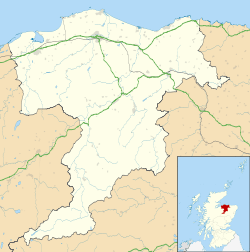Fochabers
Fochabers
| |
|---|---|
|
Fochabers village, beside the River Spey | |
 Fochabers Fochabers shown within Moray | |
| Population | 1,728 (2011 census) |
| OS grid reference | NJ345585 |
| Council area | |
| Lieutenancy area | |
| Country | Scotland |
| Sovereign state | United Kingdom |
| Post town | Fochabers |
| Postcode district | IV32 |
| Dialling code | 01343 |
| Police | Scottish |
| Fire | Scottish |
| Ambulance | Scottish |
| EU Parliament | Scotland |
| UK Parliament | |
| Scottish Parliament | |
Fochabers (/ˈfɒxəbərz/; Scottish Gaelic: Fachabair or Fothabair) is a village in the Parish of Bellie, in Moray, Scotland, 10 miles (16 km) east of the cathedral city of Elgin and located on the east bank of the River Spey. 1,728 people live in the village, which enjoys a rich musical and cultural history. The village is also home to Baxters,[1] the family-run manufacturer of foodstuffs.
Its name may be from Gaelic "feith" meaning a bog and "aber" meaning "river-mouth".
The village owes its existence to Alexander Gordon, 4th Duke of Gordon (1743–1827).[2] During the late-eighteenth century, during the Scottish Enlightenment, it was fashionable for landowners to found new towns and villages; these can be recognised all over Scotland, because unlike their predecessors they all have straight, wide streets in mainly rectangular layouts, a central square, and the houses built with their main elevations parallel to the street. The tenants benefited from more spacious homes, and the Duke, it has to be said, benefited from not having the hoi polloi living in hovels right on the doorstep of Gordon Castle. Fochabers was founded in 1776, and is one of the best examples of a planned village. It is a conservation area, with most of the buildings in the High Street listed as being of historical or architectural interest. The Roman Catholic church, St. Mary's Fochabers houses works by notable craftsmen.
Electricity was brought to the village in 1906 by Charles, 7th Duke of Richmond and Gordon[3] supplied from a small hydro-electric generating station built in 1905 in the Quarters district on the banks of the fast-flowing Spey.[4] For a time in the mid-twentieth century, Fochabers was the home of three duchesses - Hilda, Duchess of Richmond and Gordon; Ivy, Duchess of Portland and Helen, Duchess of Northumberland. Between 1893 and 1966 the village had a railway station, Fochabers Town, although after 1931 this was open only to frieght.
For nearly three decades, the people of Fochabers campaigned for a bypass, as the village is situated on the A96, the only direct route from Aberdeen to Inverness, and consequently suffers from serious traffic problems. Construction work on a bypass for Fochabers and the neighbouring village of Mosstodloch started on 2 February 2010 and was completed in January 2012, at a cost of £31,500,000.[5] The project was significantly delayed due to conflict regarding the proposed route, and discovery of a Neolithic settlement on the site of the bypass.
Education
There are two schools in Fochabers, Milne's Primary School (formerly Milne's Institution) and Milne's High School, which currently serves approximately 600 pupils from Fochabers itself and the surrounding villages and farms. Milne's Institution was originally built in 1846, in accordance with Alexander Milne's Last Will and Testament,[2] using money ($100,000) he left for this purpose.
Notable Fochaberians
- John M Caie — author of The Puddock
- Alexander Milne (1742–1838) — Scottish-American entrepreneur and philanthropist
- William Marshall (Scottish composer) (1748–1833)
- Arthur Robertson Cushny FRS (1866–1926) — Professor of pharmacology at Universities of Michigan, US; London and Edinburgh. Pioneer in the study of human renal function
- George Chalmers (1742–1825) — Antiquarian and political writer
- Sir Ashley Watson Mackintosh KCVO FRCP (1868–1937) — Benefactor to Milne's Institution, Fochabers. Regius Professor of Medicine, University of Aberdeen. Honorary physician in Scotland to HM King George V
- Jane Maxwell (1748–1812) — fourth Duchess of Gordon
- George Muirhead FRSE - naturalist and Commissioner to the Duke of Gordon
- Jean Christie — fifth Duchess of Gordon
- John Webster (1814–1890) — Plant breeder and horticulturist, head gardener to the Dukes of Richmond & Gordon
- John Russell (1819–1893) — Still-life and wildlife artist. Leading painter of Spey salmon of the Victorian era
- Sir James Sivewright KCMG (1848–1916) — Telegraph and railway pioneer in South Africa. Cape Colony politician and member of Cecil Rhodes' cabinet
- Sir James Cantlie FRCS KBE (1851–1926) — Co-founder of the Royal Society of Tropical Medicine and Hygiene
- William Mackenzie (1882–1947) — Banker and gold fields pioneer, South Africa
- Fiona Mackenzie (born 1961) — Gaelic Singer and Mod Gold Medal winner from Orton, Fochabers
- Allan Wilson (1856 – 1893) — A Major in the Victoria Volunteers and commander of the infamous Shangani Patrol. His last stand fighting overwhelming odds made him a national hero in Britain and Rhodesia.
References
- ↑ "About Baxters: History". Baxters Food Group. Archived from the original on 20 July 2011. Retrieved 25 April 2011.
- 1 2 "Fochabers: Overview". Gazetteer for Scotland. Retrieved 20 March 2018.
- ↑ https://www.thehistoryguide.co.uk/charles-7th-duke-of-richmond-and-gordon/
- ↑ http://www.morayways.org.uk: "A wooden bridge across the burn leads to a dwelling house standing on the site of a small hydro-electric power station built in 1905. This area, known as The Quarters, consists of a dozen houses one of whose garages is part of an old turfroofed icehouse."
- ↑ "Fochabers bypass work gets under way". BBC News. 2 February 2010. Retrieved 25 April 2011.
External links
| Wikimedia Commons has media related to Fochabers. |
